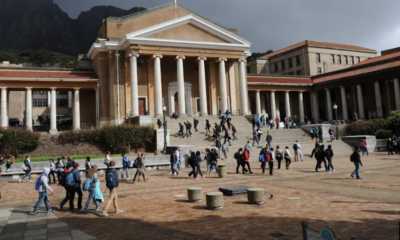
OpEds

A donor’s dilemma at UCT
The University of Cape Town (UCT) senate will on Friday, 8 March, consider no fewer than three separate motions about the current war in Gaza. It will come as no surprise that these motions, proposed by members of the senate, all target Israel, with two of them calling for boycotts.
This isn’t the first time that anti-Israel motions have been brought to UCT’s senate. When it previously approved such a motion, UCT’s governing body, the council, referred the matter back to the senate for reconsideration, with the result that the decision was reversed.
In the interim, the council has itself taken a stand against Israel in the form of a vacuous statement about the war against Hamas. I’m not aware of any other country being the subject of such obsessive and compulsive attention by UCT. This is all in keeping with a global trend of many universities to become increasingly hostile to Israel and those Jews and others not willing to fall in line with condemnation of Israel.
Current and prospective donors might be wondering how to react to these developments. Voicing their concerns carries two related risks. First, it might be perceived, not without some justification, as interference in academic freedom. If donors make their donations contingent upon universities taking one course of action over another, there are reasonable questions to be asked about the influence of donors on the operations of a university.
Of course, boycotts themselves, when coercive, which some of the proposed UCT ones would be, are also threats to academic freedom. However, one then enters the messy terrain of justifying one violation of academic freedom by reference to another. Even if that’s sometimes justified, this complexity can be avoided.
The second risk is feeding the antisemitic beast. We all know that antisemitism is driven not by what Jews do, but rather by what antisemites think they do. However, Jewish donors should be especially concerned about their actions being used as fodder for those who peddle stereotypes about “Jewish control” via “Jewish money”.
If Jews had the influence that antisemites think they did, Israel wouldn’t be as marginalised and targeted as it is. Nor is there evidence that Jewish donors act any differently from other donors who find their beneficiaries not acting as they – the donors – would like. Nevertheless, we cannot ignore the dangers of antisemitism, especially when there’s independent reason to avoid using influence.
None of this means that donors must blithely continue donating irrespective of what their beneficiaries do. However, there’s an alternative course of action, namely to remain quiet until the point that one feels that one can no longer support an institution, and then to stop funding it. Withholding funding is then reactive to university decisions already taken, rather than seeking to influence institutional decisions yet to be taken. With this strategy, institutions are free to act as they see fit, and the donors are equally free to act as they see fit but without donors reasonably being seen as influencing the institution.
Of course, a university might anticipate such donor action, and this might be thought to constitute undue influence, but there are a few reasons to discount this concern. Most importantly, institutional anticipation of donor withdrawal isn’t avoidable unless donors are required to contribute irrespective of whether they approve of the direction their beneficiary institution is taking. There can be no such requirement.
How bad an institution must become before a donor decides that he or she can no longer contribute in good conscience will vary from donor to donor. For some, UCT has long since passed that point. For others it might be imminent.
When donors do decide to withhold funds, they might seek alternative good causes. These could include Israeli universities themselves, or funding for South African students to study at them, especially as the quality of South African universities, just like the rand, continues to decline.
- David Benatar, Emeritus Professor of Philosophy, writes in his personal capacity.










